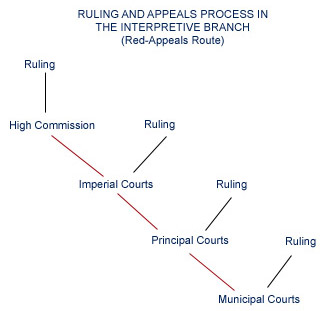| The interpretive branch seeks to answer the grand questions of Imperial/Oblastine/Municipal questions as they relate to the Charter of 1798. That is, they seek to interpret the intent of laws created over a hundred years ago and frame them in the context of modernity. At the pinnacle of the interpretive branch is the High Commission. Comprised of nine legal experts, the High Commission issues judgements that answer what are considered broad cultural, political, and Charter-related policy issues. Each of the experts, the Commissars, which sit on this High Commission are appointed by the national legislatures of each Principality in the empire. The longest serving Commissar is considered the Chairman of the High Commission and acts as its spokesperson and moderator during deliberations. Every two years, the Chairperson must resign. The legislature of the Principality which elected the outgoing Chairperson then selects another Commissar who becomes most junior of the nine. The second oldest Commissar than steps up to become Chairperson. |
| Current High Commission (in order of seniority) |
| Chairman Augustus Beck, FRI, Conservative
, Retired Rear Admiral, Imperial Naval Forces Commissar Nikolai Bogolov, POL, Liberal , Founder, Varangian Human Rights Watch Commissar Marta von Liemen, RUS, Liberal , Former President, Imperial Organization for Women's Advocacy Commissar Sviatopolk Gudinov, CAR, Conservative , Former Chief Executive Officer, Merchanting Bank, Inc. Commissar Marina Peshkova, LIT, Moderate, Former Boyar of Hlacova Suboblast Commissar Heinrich Bayer, MAS, Liberal , Founder, Kosaman People's Party Commissar Svetislav Nabukhin, UPR, Conservative, Former Chief Executive Officer, The Lubov Industrial Concern, Inc. Commissar Jaromir Tula, COS, Moderate , Former Sub-minister, Imperial Ministry of Justice Commissar Ladislav Horthy, FLO, Liberal, Former Lead Counsel, Varangian Human Dignity Coalition |
 |
| The above schematic demonstrates the multilayered disposition of the way law is interpreted in the Imperial system. In the imperial interpretive system, the party which loses a decision may appeal to the next layer of arbitration. However as a claimant ascends the heirarchy towards a judgement by the High Commission, the burden of proof that must be presented as to why a ruling against them should be nullified increases. Each successive heirarchy sees approximately sixty percent less cases then the one below it. Many of the cases that enter the interpretive system at the municipal level are resolved there through non-court agreements or through rulings in the municipal courts. Each hierarchy also has the discretionary authority to hear or not hear an appeal. Principal and Imperial Courts, as well as the High Commission, are not bound by a set of guidelines which mandate which appeals they should here. That decision is made by a bank of judges depdning on criteria they formulate themselves. |
 |
